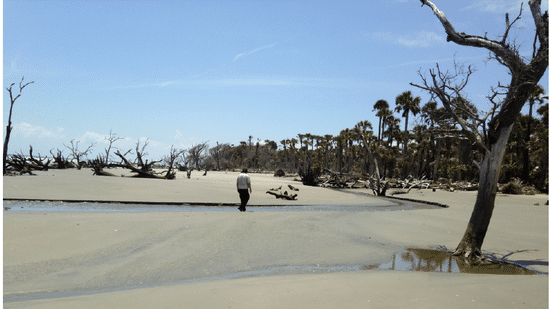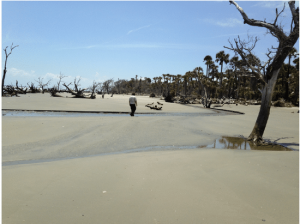Seminar Summary: Building Adaptive Capacity in a Coastal Region Experiencing Global Change

On May 21, 2020, Dr. Mitch Eaton (USGS Research Ecologist at the Southeast Climate Adaptation Science Center) presented the second seminar in our SE CASC & South Atlantic Spring/ Summer Science Series, entitled Building Adaptive Capacity in a Coastal Region Experiencing Global Change. View a recording of the presentation here. Global Change Fellow Sam Flake contributed the following summary of the seminar.

In the second presentation in our SE CASC & South Atlantic Spring/Summer Science Series, Dr. Mitch Eaton from the SE CASC described lessons from an innovative collaborative decision making project at Cape Romain National Wildlife Refuge in the Lowcountry region of South Carolina. The challenges that global change processes pose for habitat conservation in coastal South Carolina are multifarious. While sea level rise poses a primary threat to coastal wildlife refuges, other processes such as urban expansion and coastal hardening constrain the potential responses to sea level rise. Decisions about management of the refuge must also be sensitive to local stakeholder considerations while also respecting limitations imposed by narrow organizational mandates and trade-offs imposed by limited capacity. Important problems encountered by Cape Romain, identified in workshops, were the complexity of converting stakeholder values into clear objectives and the limited capacity of managers to address problems on scales such as that of sea-level rise (i.e., a scale mismatch between the problem and potential solutions). To support planning and decision-making in this context, the project team established the Cape Romain Partnership for Coastal Conservation.
Dr. Eaton’s talk focused on the need for communication and groundwork to promote long-term collaboration and collective decision-making among diverse stakeholders with varying interests. For this case study focused in the region around Cape Romain NWR, partners were recruited from local groups with an interest in conservation. The partnership included resource agencies and conservation NGOs as well as community organizations for underrepresented populations. Rather than a focus on solely providing conservation science support, the project team engaged with stakeholders to develop and test new methods and processes for collective learning and collaborative adaptation planning. The talk emphasized that climate adaptation must not be limited to ecological adaptation, but that social adaptation is key for community resilience and development of locally generated solutions. The group used a variety of methods, including stakeholder assessment, scenario planning, and evaluation of strengths and weaknesses of the partnership and how to leverage them to address opportunities and threats.
Dr. Eaton highlighted the need for values-based approaches that allow for flexibility in addressing the concerns and values of the local stakeholders. Scale mismatches are frequent in planning, and were frequently discussed by the partnership, necessitating changing the scope of the problem the partnership addressed. Ecological problems cannot be separated from local culture and politics, and organizational constraints and objectives can expand or constrain the way that a problem is tackled. Organizing diverse local stakeholders and using new methods to facilitate collaborative decision-making, in the way that the Cape Romain Partnership for Coastal Conservation has done, will be an important facet of adaptation to global change.
The next presentation in this series, Clarifying Science Needs for Southeastern Grasslands: The Piedmont, Coastal Plain, and Beyond, will be presented on June 18, 2020 at 10AM. Learn more about the series and register for this presentation here.
- Categories:
